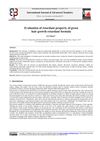 11 citations,
June 2022 in “Frontiers in immunology”
11 citations,
June 2022 in “Frontiers in immunology” New protein changes may be involved in the immune attack on hair follicles in alopecia areata.
 11 citations,
April 2020 in “Life sciences”
11 citations,
April 2020 in “Life sciences” Pantothenic acid helps mink hair follicles grow by affecting certain cell signals.
 11 citations,
September 2007 in “Advances in therapy”
11 citations,
September 2007 in “Advances in therapy” INVERSION Femme supplement helped women lose weight, reduce hair loss, and improve skin and nail health.
 10 citations,
January 2021 in “Journal of Ginseng Research”
10 citations,
January 2021 in “Journal of Ginseng Research” Red ginseng oil may help grow hair and protect skin from UVC light.
 9 citations,
June 2021 in “Nutrients”
9 citations,
June 2021 in “Nutrients” Fisetin in fruits and vegetables helps hair growth in mice.
 9 citations,
January 2005 in “Experimental dermatology”
9 citations,
January 2005 in “Experimental dermatology” Melatonin receptors in hair follicles help regulate hair growth and could treat hair loss.
 8 citations,
June 2019 in “Scientific Reports”
8 citations,
June 2019 in “Scientific Reports” Increased PPARGC1α relates to hair thinning in common baldness.
 5 citations,
September 2020 in “Journal of Cosmetic Dermatology”
5 citations,
September 2020 in “Journal of Cosmetic Dermatology” Dexpanthenol improves hair growth and satisfaction in women without side effects.
 5 citations,
January 2016 in “Genetics and Molecular Research”
5 citations,
January 2016 in “Genetics and Molecular Research” Researchers found 617 genes that behave differently in cashmere goat hair follicles, which could help understand hair growth.
 5 citations,
January 2011
5 citations,
January 2011 Gyungokgo-gamibang extract significantly promotes hair growth and increases hair thickness.
 4 citations,
October 2022 in “Frontiers in public health”
4 citations,
October 2022 in “Frontiers in public health” Cadmium chloride pollution can cause skin disorders, speed up aging, and prevent hair growth.
 4 citations,
February 2022 in “Frontiers in molecular biosciences”
4 citations,
February 2022 in “Frontiers in molecular biosciences” Chronic stress in mice changes skin metabolism and gene expression, leading to hair loss.
 3 citations,
January 2017 in “Journal of cosmetology & trichology”
3 citations,
January 2017 in “Journal of cosmetology & trichology” The nutritional supplement improved hair quality and reduced hair loss.
 3 citations,
January 2016 in “Annals of Dermatology”
3 citations,
January 2016 in “Annals of Dermatology” Minoxidil was the most effective treatment for hair regrowth in rats compared to Aminexil or Kerium.
 2 citations,
August 2019 in “International Journal of Applied Pharmaceutics”
2 citations,
August 2019 in “International Journal of Applied Pharmaceutics” Niosomes can effectively deliver Superoxide Dismutase to hair follicles, potentially helping prevent hair loss.
 2 citations,
July 2018 in “Elsevier eBooks”
2 citations,
July 2018 in “Elsevier eBooks” Some supplements may help with hair loss, but there's not enough strong evidence to recommend them without doctor advice.
 1 citations,
September 2023 in “eLife”
1 citations,
September 2023 in “eLife” TLR2 is important for hair growth and can be targeted to treat hair loss.
 1 citations,
January 2023 in “Frontiers in veterinary science”
1 citations,
January 2023 in “Frontiers in veterinary science” Activating autophagy in dogs with certain diseases improves their skin and hair.
 1 citations,
January 2022 in “Rasayan journal of Chemistry”
1 citations,
January 2022 in “Rasayan journal of Chemistry” Albizia saponaria bark ethanol extract, particularly at 15%, promotes hair growth in rabbits.

Adequate vitamin D might lower, and high hair chromium might increase DNA damage in obese women.
 1 citations,
September 2013 in “Elsevier eBooks”
1 citations,
September 2013 in “Elsevier eBooks” Hair ages and thins due to factors like inflammation and stress, and treatments like antioxidants and hormones might improve hair health.
 1 citations,
January 2001 in “Cosmetics and toiletries”
1 citations,
January 2001 in “Cosmetics and toiletries” Procyanidin B-2 from apple juice significantly increases hair growth and may be more effective than minoxidil without side effects.
 April 2024 in “Lasers in medical science”
April 2024 in “Lasers in medical science” Near-infrared LED light improves skin rejuvenation and hair growth better than white LED light.
 February 2024 in “International Journal of Health and Pharmaceutical”
February 2024 in “International Journal of Health and Pharmaceutical” Black rice extract ointment significantly promotes hair growth in Wistar rats.
 January 2024 in “GeroScience”
January 2024 in “GeroScience” Using radiation to make mice's hair turn gray helps study and find ways to prevent or reverse hair graying.
 November 2023 in “Frontiers in cell and developmental biology”
November 2023 in “Frontiers in cell and developmental biology” Hair aging is caused by stress, hormones, inflammation, and DNA damage affecting hair growth and color.
 October 2023 in “bioRxiv (Cold Spring Harbor Laboratory)”
October 2023 in “bioRxiv (Cold Spring Harbor Laboratory)” Blocking both main energy pathways can stop hair follicle stem cell-induced skin cancer growth.

Water and fatty acids affect hair's surface differently based on hair damage, and models can help understand hair-cosmetic interactions.
 August 2021 in “Journal of Fundamental and Applied Pharmaceutical Science”
August 2021 in “Journal of Fundamental and Applied Pharmaceutical Science” Black tea extract at 5% concentration promotes the most hair growth.
 May 2019 in “International journal of advanced chemistry”
May 2019 in “International journal of advanced chemistry” The green cream safely slowed hair growth by 25%.






























